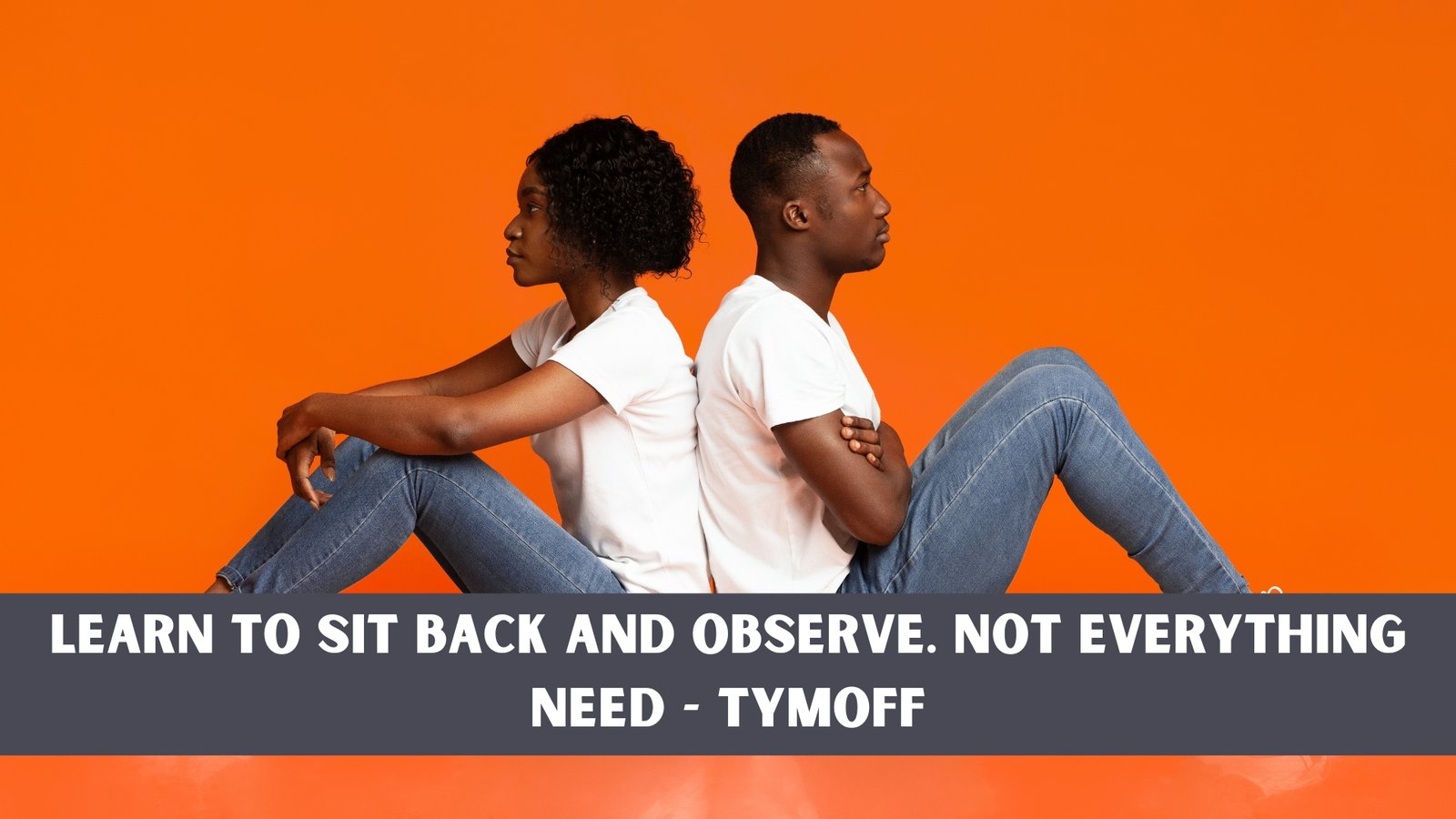In today’s fast-paced and reactive world, it can be easy to get caught up in the chaos of everyday life. However, it is essential to remember the saying, “Learn to sit back and observe. Not everything needs a reaction – tymoff.” This simple yet profound statement reminds us of the power of observation and the importance of staying calm and serene in facing challenges. This blog post will explore the benefits of learning to sit back and observe, understand the Tymoff Principle, and discuss practical tips for becoming more observant in our daily lives.
The Power of Observation in a Reactive World
In an era characterized by immediacy and snap judgments, embracing the art of observation offers an oasis of insight and understanding amidst the storm. Our current culture propels us towards rapid response and decision-making, often at the expense of depth and reflection. Yet, by choosing to pause and immerse ourselves in the act of observation, we unlock many benefits beyond the surface level. This deliberate shift in perspective allows us to absorb the subtleties and nuances of our environment, relationships, and inner emotional landscape, fostering a deeper connection with the world and its complexities.
Observation bridges empathy and understanding, allowing us to see beyond our initial impressions and biases. It invites us to question our assumptions and explore the layers of meaning beneath our immediate reactions. Through this lens, we are better equipped to navigate the intricate web of human interaction and the ever-evolving dynamics of our surroundings. As we cultivate this skill, we notice patterns and signals previously obscured by the haze of haste and inattention.
Furthermore, this approach nurtures our capacity for critical thinking and problem-solving. With a more comprehensive grasp of the factors, our responses become more nuanced and considered. We move away from the knee-jerk reactions that often lead to misunderstandings and conflicts towards responses infused with wisdom and intentionality. This transformation enhances our personal growth and contributes to cultivating a more thoughtful and wise society.
Understanding the Tymoff Principle
The Tymoff Principle, rooted in the wisdom of “Learn to sit back and observe. Not everything needs a reaction – tymoff,” is a vital guide for cultivating mindfulness and restraint in an often impulsive world. This principle implores us to embrace a more reflective stance towards life’s unfolding events, urging a momentary pause to assess situations before leaping into action. It challenges the prevailing norm of immediate response, advocating for a measured and thoughtful approach to our interactions and decisions.
Embracing the Tymoff Principle involves a deliberate shift towards introspection and awareness, encouraging individuals to observe not just with their eyes but with their minds and hearts. It’s about developing an inner calm that becomes a source of strength, allowing for a more considered response to minor irritations and significant challenges. This principle is not a call to passivity but an invitation to empowered action—choosing when and how to engage in a mindful and effective way.
By integrating the Tymoff Principle into our daily lives, we learn the value of patience and strength from a calm and composed demeanor. It teaches us that not every provocation demands our energy, and not every moment requires our commentary. Doing so opens up a space for growth, enabling us to respond to life’s complexities with a sense of poise and purpose rather than being perpetually reactive. This mindfulness approach fosters a deeper understanding of our environment and ourselves, highlighting the profound impact of observation on personal and interpersonal dynamics.
The Benefits of Practicing Serenity
Embracing serenity by sitting back and observing unlocks numerous advantages for our holistic well-being. This state of tranquility significantly lowers stress and anxiety levels, creating a peaceful mind free from the clutter of constant reactivity. When we adopt a serene approach, our ability to concentrate improves, allowing for enhanced clarity and productivity in our tasks and pursuits. This not only aids in personal development but also strengthens our capacity for making informed, thoughtful decisions.
Moreover, serenity nurtures emotional resilience, equipping us with the fortitude to face life’s adversities with grace and composure. It fosters an environment where relationships can thrive, as it encourages patience and empathy, enabling us to understand and connect with others on a deeper level. In physical health, the calmness derived from serenity can contribute to lowering blood pressure and reducing the risk of stress-related ailments, promoting a healthier, more balanced life.
Engaging in serenity cultivates a mindset where joy and contentment can flourish, free from constant worry and agitation. It encourages us to appreciate the present moment, finding beauty and satisfaction in the simplicity that often goes unnoticed. This mindful approach to life’s journey enriches our experiences, providing a profound sense of fulfillment that transcends the temporary highs of reactive living.
Practical Tips for Becoming More Observant
Consider incorporating these actionable strategies to enhance your observational skills and effectively apply the Tymoff Principle in your life. Begin by dedicating moments of your day to disconnecting from the digital world, which often distracts us from the rich tapestry of life happening around us. Engage in people-watching in public spaces, not with judgment but with curiosity about the stories and experiences unfolding before your eyes. This practice sharpens your ability to notice subtle nuances in behavior and interactions.
Another valuable technique is keeping a journal to record your observations and reflections. Writing down what you see, hear, and feel encourages a deeper processing of your experiences, solidifying your observational acumen. It can also reveal patterns in your reactions and the world that may go unnoticed.
In conversations, challenge yourself to identify what the other person is saying and what they might be leaving unsaid. Pay attention to non-verbal cues such as facial expressions, gestures, and tone of voice. This level of attentiveness can significantly enhance your understanding and empathy, fostering stronger connections with others.
Lastly, immerse yourself in environments outside of your comfort zone. Exposure to new situations and settings can significantly boost your powers of observation, as unfamiliarity naturally heightens your awareness. By following these steps, you can cultivate a more observant and mindful approach to life, allowing you to navigate its complexities with greater insight and understanding.
Real-Life Examples of Observation-Changing Outcomes
The impact of observation on altering the trajectory of events can be seen in diverse scenarios, highlighting its universal applicability. In professional settings, consider a scenario where a manager carefully observes the team’s dynamics and identifies undercurrents of dissatisfaction. This insight allows for early intervention, potentially averting a more significant crisis and fostering a more cohesive work environment. In another instance, a teacher observes a student’s subtle signs of struggle, not visible through grades alone. By addressing these issues, the teacher can provide the necessary support, significantly influencing the student’s academic journey and self-esteem.
On a personal level, observation plays a crucial role in deepening relationships. An individual might notice a friend’s uncharacteristic withdrawal or silence, prompting a conversation that reveals underlying issues and strengthening the bond through understanding and support. Similarly, in personal development, an individual’s self-observation leads to the realization of a destructive habit. This awareness becomes the first step towards change, ultimately improving their quality of life.
These examples underscore the transformative power of observation. Whether preempting challenges in a team, aiding a struggling student, enhancing interpersonal relationships, or fostering personal growth, observing before acting can lead to more thoughtful and impactful outcomes.
Must Read: Little_Mermaidd0: A Tale of a Mermaid Princess and a Human Prince
Overcoming the Challenges of Implementing the Tymoff Principle
Embracing the Tymoff Principle fully requires a significant shift in our habitual ways of engaging with the world. The inclination to react quickly to stimuli, whether a comment, an email, or an event, is deeply ingrained in many of us, driven by societal pressures and the rapid pace of modern life. Transitioning from a state of constant reactivity to one of thoughtful observation and calm poses its hurdles. The key to overcoming these challenges lies in incremental change and consistent practice. Initiating minor but meaningful adjustments to your daily routine can pave the way for a more observant and serene existence. For instance, setting aside time each day for quiet reflection or mindfulness exercises can help anchor you in the present moment, reducing the urge to react immediately. Engaging in regular periods of digital detox can also diminish the bombardment of information that fuels impulsivity, creating a space for more deliberate thought and action.
Additionally, cultivating patience is critical. Internalizing the Tymoff Principle is gradual, and there will be moments of fallback. However, by acknowledging these as part of the journey and not as failures, you can maintain momentum toward a more mindful approach to life’s experiences. With dedication and self-compassion, the challenges of adopting this principle can be navigated, leading to enhanced well-being and a more fulfilling interaction with the world around you.





